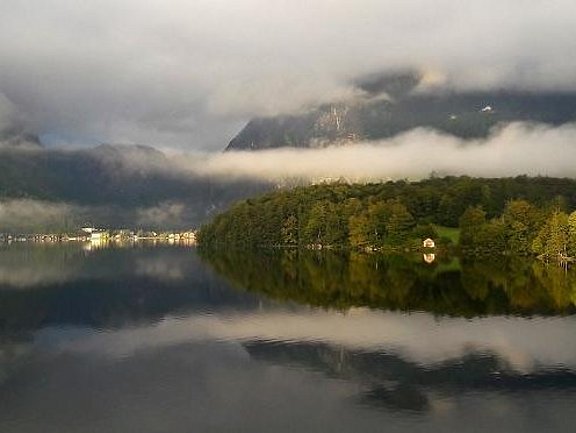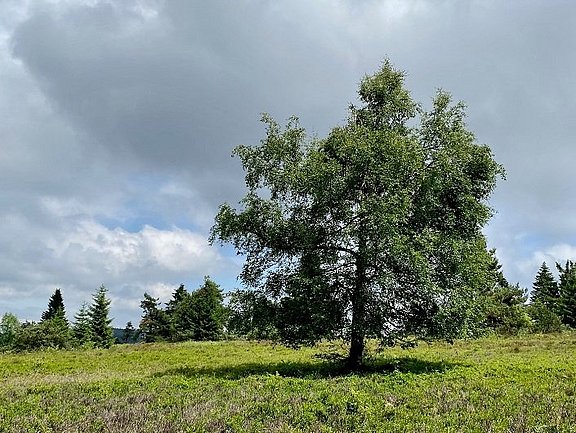Pausing in awe and gratitude and experiencing nature
Awe and gratitude questionnaire
Pausing in awe and feelings of gratitude as an expression of the ability to resonate with the world around us: sensitisation for a mindful, appreciative perception of the world around us as the starting point for a conscious commitment to others and the environment.
People experience that in certain situations or in certain places they pause as if spellbound, that they are touched and moved by this particular moment. This can be operationalised as an astonished pause in awe. This pausing with subsequent feelings of gratitude can be seen as an expression of a perceptive aspect of spirituality that is also significant for non-religious people. The frequency of this feeling can be measured with the newly developed Awe Gratitude Questionnaire (GrAw-7), which was used in different groups of people. In this way, conditions and contextual factors can be analysed.
Qualitative methods were also used to describe the triggers of these feelings and the resulting feelings, both in the general population and in people with a particular lifestyle and spiritual practice (e.g. religious and yoga practitioners). These can be assigned to the main categories of nature, special people, special moments, aesthetics/art/culture, religious practice and perception of transcendence.
As there is a clear connection with the spiritual background and spiritual practice of certain groups of people, the aim is to sensitise people to this perception in a research project with several sub-steps.
Intervention project to raise awareness of feelings of reverence and gratitude in everyday life
If you are interested, you will find all the necessary information on the intervention project page.

Further information
- Duration: ten years
- Funding: Own funds
- Responsible: Professorship of Life Quality, Spirituality and Coping | Gerhard Kienle Chair of Medical Theory, Integrative and Anthroposophic Medicine
- Co-operation partner:
IUNCTUS- Competence Centre for Christian Spirituality, PTH Münster;
Caritas Science and Christian Social Work, Albert-Ludwigs-Universität Freiburg;
Cardinal Wyszynski University in Warsaw;
Chair of Social and Health Education, Catholic University of Eichstätt-Ingolstadt;
Clinic for Psychiatry, Psychotherapy and Preventive Medicine, LWL University Hospital Bochum, Ruhr University Bochum;
Shahid Beheshti University of Medical Sciences in Tehran, Iran;
Chakwal University, Pakistan - Methods used: Empirical findings and qualitative analyses
Previous publications
- Büssing A, Weit M, Baumann K: Experiences of Awe and Gratitude and Related Triggers among Religious Brothers and Sisters: Findings from a Cross-Sectional Study in Germany (submitted).
- Steinhausen-Wachowsky A, Martin D, Recchia DR, Büssing A: Stability of psychological wellbeing during the COVID-19 pandemic among people with an anthroposophical worldview: The influence of wondering awe and perception of nature as resources. Frontiers in Public Health 2023; 11:1200067;
https://doi.org/10.3389/fpubh.2023.1200067 - Büssing A, Zini A, Vered Y: Experience of Wondering Awe and Perception of Nature as a Resource during the COVID-19 Pandemic-Findings from a Cross Sectional Survey of Participants in Jerusalem. Religions 2023; 14: 276.
https://doi.org/10.3390/rel14020276 - Konaszewski K, Skalski SB, Büssing A, Surzykiewicz J: Adaptation and Preliminary Evaluation of the Psychometric Properties of the Polish Version of the Gratitude/Awe Questionnaire (GrAw-7). Journal of Beliefs & Values 2022;
https://doi.org/10.1080/13617672.2022.2153352 - Büssing A: Changes in the experience of awe and gratitude during the corona pandemic - findings from a continuous study. Consciousness Sciences - Transpersonal Psychology and Psychotherapy 2022; 28: 6-14.
- Büssing A, Recchia RR, Baumann K: Experience of nature and times of silence as a resource to cope with the COVID-19 pandemic and their effects on psychological wellbeing - Findings from a continuous cross-sectional survey in Germany. Frontiers in Public Health 2022; 10: 1020053;
https://doi.org/10.3389/fpubh.2022.1020053 - Büssing A: Wondering Awe as a perceptive aspect of spirituality and its relation to indicators of wellbeing: Frequency of perception and underlying triggers. Frontiers of Psychiatry 2021; 12:738770.
https://doi.org/10.3389/fpsyg.2021.738770 - Büssing A, Recchia RR, Dienberg T, Surzykiewicz J, Baumann K: Dynamics of perceived positive changes and indicators of wellbeing within different phases of the COVID-19 pandemic. Frontiers in Psychiatry 2021;
https://doi.org/10.3389/fpsyt.2021.685975 - Büssing A, Recchia DR, Dienberg T, Surzykiewicz J, Baumann K: Awe/Gratitude as an Experiential Aspect of Spirituality and Its Association to Perceived Positive Changes During the COVID-19 Pandemic. Front. Psychiatry, 20 April 2021 | https://doi.org/10.3389/fpsyt.2021.642716
- Büssing A: In resonance with life: Reverence and gratitude as a perceptual form of spirituality. In: Prescher T, Nass E, Büssing A (eds.): Utopia and Reality: Spirituality as the fulfilment of one's own growth. Mainz Publishing Group 2022, pp. 175-198.
- Büssing A: Reverence/gratitude as a secular form of spirituality in young adults and religious Christians. Spiritual Care 2020; 9: 3-11.
https://doi.org/10.1515/spircare-2019-0057 - Büssing A, Rechia DR, Baumann K: Validation of the Gratitude/Awe Questionnaire and Its Association with Disposition of Gratefulness. Religions 2018, 9, 117;
https://doi.org/10.3390/rel9040117 - Büssing A, Wirth AG, Reiser F, Zahn A, Humbroich K, Gerbershagen K, Schimrigk S, Haupts S, Hvidt NC, Baumann K: Experience of gratitude, awe and beauty in life among patients with multiple sclerosis and psychiatric disorders. Health and Quality of Life Outcomes 2014; 12:63.
https://doi.org/10.1186/1477-7525-12-63 - Büssing A, Wirth AG, Humbroich K, Gerbershagen K, Schimrigk S, Haupts M, Baumann K, Heusser P: Faith as a resource in patients with multiple sclerosis is associated with a positive interpretation of illness and experience of gratitude/awe. Evidence-based Complementary and Alternative Medicine 2013; Article ID 128575.
doi.org/10.1155/2013/128575
Interviews
- The Big Ponder (Goethe Institute): The Power of Awe (Interview with Arndt Büssing)
- Science Notes Magazine
- SWR2 Wissen from 22.12.2022
Project management

Univ.-Prof. Dr.
Arndt Büssing
Professor
Faculty of Health (School of Medicine) | Chair of Medical Theory, Integrative and Anthroposophic Medicine
- +49 2330 62-3246
Orcid ID: 0000-0002-5025-7950
Gerhard-Kienle-Weg 4
58313 HerdeckeRoom number: Haus D, DG
Experience nature
In recent years, nature as a space for experiencing and experiencing has increasingly become the focus of health psychology research. In addition, a greater socio-political awareness of ecology can be observed in the wake of post-materialism. This is associated with a greater (subjectively perceived) closeness to nature. This describes a person's positive attitude towards nature as a habitat and resource. This also leads to an awareness of ecological responsibility, interest in environmental protection and sustainability.
The health-related aspects of closeness to nature and experiencing nature are quite complex and contradictory in their effects, as the specific content is significant. The different aspects of closeness to nature as intentional behaviour, as an affective experience and as a cognitive attitude are significant and are the focus of our research projects.
The aim of the research project is to sensitise people to the experience of nature as a meeting place. On the one hand, this can have positive health-related effects and, on the other, it can also contribute to the intention of preserving and protecting an endangered habitat. The different meanings of the experience on the one hand and the emotional connection as well as a marvelling pause in "awe and gratitude" on the other on the subjective state of mind are unclear.

Further information
- Responsible: Professorship of Life Quality, Spirituality and Coping | Gerhard Kienle Chair of Medical Theory, Integrative and Anthroposophic Medicine
- Current projects:
Experiencing nature as a health-relevant resource
Pausing in wonder at special places - experiencing nature as a health-relevant resource
Pausing in wonder in awe and gratitude, experiencing nature, prosocial behaviour and life satisfaction - Cooperation partners:
Chair of Social and Health Education, Catholic University of Eichstätt-Ingolstadt
Sauerland Tourismus e. V.
Previous publications
- Büssing A. Recchia DR, Ortiz M: Validation of a questionnaire instrument to assess the experience of nature as a subjective sensation (submitted)
- Büssing A, Baumann K: Conscious Perception of Nature and Times of Silence as Resources to Improve Public Mental Health - An Editorial. Frontiers in Public Health 2024 (in press)
- Büssing A, Recchia DR, Baumann K: Experience of nature and times of silence as a resource to cope with the COVID-19 pandemic is mediating the effects of Awe and Gratitude on psychological Wellbeing - Findings from a continuous cross-sectional survey in Germany. Frontiers in Public Health 2022; 10:1020053. https://doi. org/10.3389/fpubh.2022.1020053
- Skalski SB, Konaszewski K, Toussaint LL, Büssing A, Surzykiewicz J: Positive Religious Coping Acts Through Perception of Nature and Silence in its Association with Well-Being and Life Satisfaction Among Polish Catholics. Frontiers in Public Health 2022; 10:1020007. https://doi.org/10.3389/fpubh.2022.1020007
Project management

Univ.-Prof. Dr.
Arndt Büssing
Professor
Faculty of Health (School of Medicine) | Chair of Medical Theory, Integrative and Anthroposophic Medicine
- +49 2330 62-3246
Orcid ID: 0000-0002-5025-7950
Gerhard-Kienle-Weg 4
58313 HerdeckeRoom number: Haus D, DG